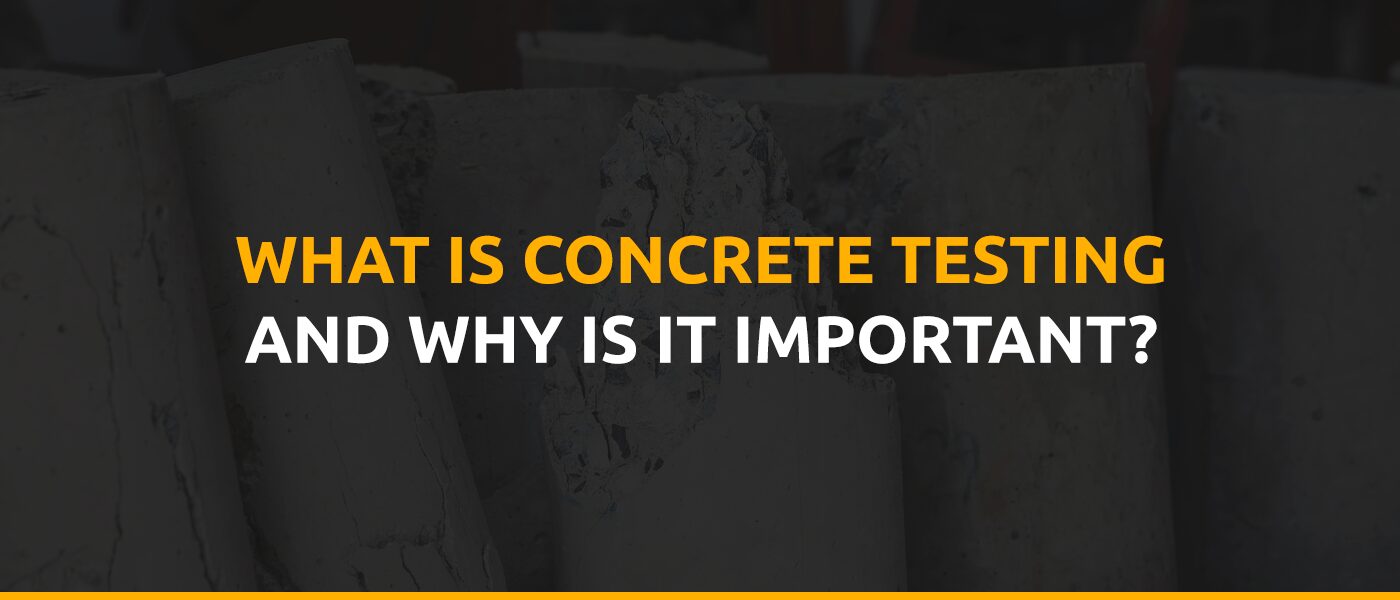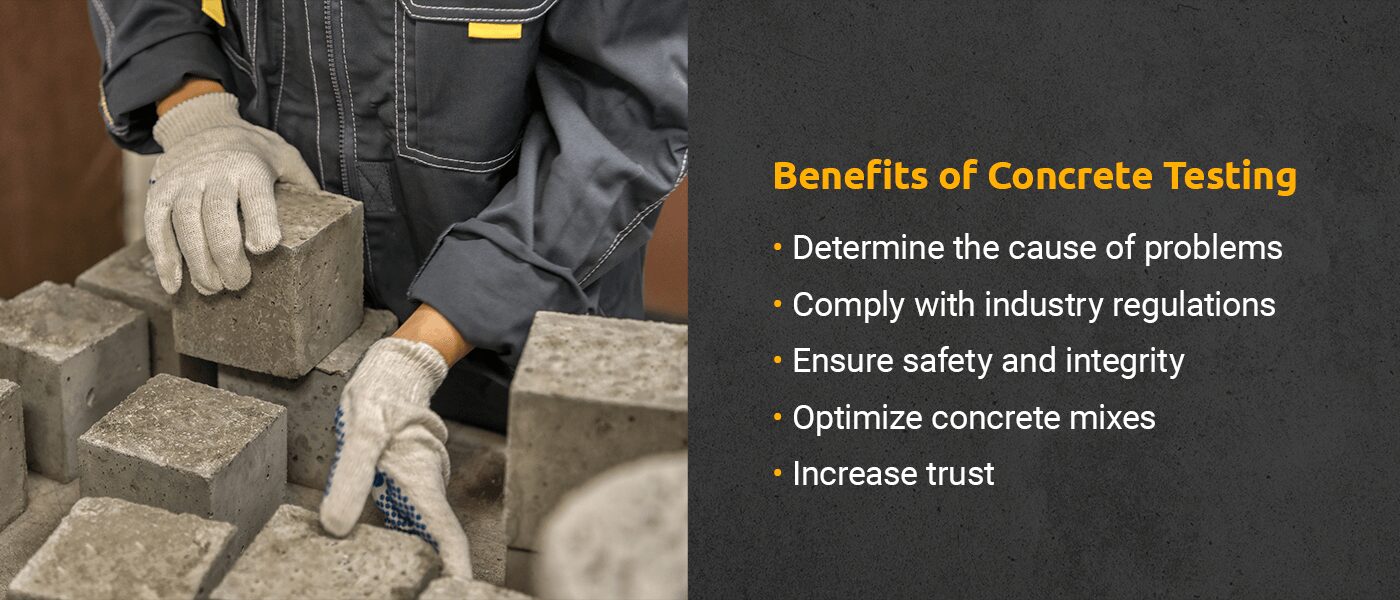
What Is Concrete Testing and Why Is It Important?
Posted By:Dynamic Concrete Pumping , Date: Mar 5, 2024

Mixing and pouring concrete is more complicated than it seems at first glance. If not cured and set correctly, concrete can fail and deteriorate, causing severe safety and structural integrity problems. But how do you know if the concrete is durable enough for its application? International and local industry authorities have created a set of concrete testing practices and standards to ensure high quality and strength. Businesses that work with concrete will create longer-lasting structures by conducting compliant concrete tests.
Learn more about concrete testing processes, their importance and some common types of tests in this guide.
What Is Concrete Testing?
Concrete testing refers to the quality control process for concrete construction, including mixing, pouring and curing. Concrete testing involves multiple quality tests that assess properties like workability, setting time, strength, air content and permeability. Overall, this testing indicates concrete’s quality and durability.
Trained professionals perform concrete tests on-site and in laboratories to ensure compliance with industry standards. Internationally, the ASTM — formerly known as the American Society for Testing and Materials — has created over 12,000 voluntary guidelines for various industries and applications, including concrete testing. In Canada, the Canadian Standards Association provides regulations for construction materials to reflect best practices in the country.
The Importance of Concrete Testing
Concrete is the most widely used construction material for building foundations, roads, walls and pavements, to name a few. High-quality concrete mixes and expert application are vital to ensure building projects’ integrity, and disaster can strike without thorough testing and regular evaluation. Such was the case for Florida’s Champlain Towers condo in 2021, when 98 people died because of dubious construction practices and deteriorated concrete.
Poor concrete practices result in failure, deterioration and flaws like these.
- Cracking: Large fractures, breaks or splits appear.
- Curling: The edges or concerns of concrete slaps bend upward or downward.
- Efflorescence: A white powder containing mineral salts forms on the surface.
- Scaling: The concrete surface starts flaking and crumbling away.
- Delamination: The concrete’s upper surface separates from the main body.
These defects can lead to project delays and costly repairs, jeopardize people’s lives and tarnish your business’ reputation.
Benefits of Concrete Testing
Your business will gain the following advantages when you conduct regular, up-to-code concrete tests.
- Determine the cause of problems: Tests provide insights into concrete’s properties, so you can quickly determine the reason when issues arise. This knowledge lets you effectively address the problem and prevent it from happening again.
- Comply with industry regulations: Correct use of cement testing practices ensures your business meets industry standards and regulations. Customers prefer to work with compliant partners, as this indicates the work is of an acceptable quality level.
- Ensure safety and integrity: Regular cement testing throughout concrete manufacturing and implementation consistently creates stronger, safer structures that perform well under varying conditions.
- Optimize concrete mixes: Through continual testing, specialists can determine concrete quality and adjust as necessary. This process results in highly optimized mixes with fewer issues.
- Increase trust: Compliant concrete testing will help you deliver dependable and durable concrete projects satisfying all client requirements. With fewer issues and happier clients, you’ll create a positive reputation for your business that clients can trust.

Types of Concrete Tests
You can perform several types of concrete tests, and the ASTM standards detail each procedure. Testing takes place in two stages, where you’ll test freshly mixed concrete first and then again when it hardens. You can collect concrete samples to perform these tests, but some can also occur in situ on the concrete slab.
Creating and Curing Concrete Samples
Testers collect samples in cylinders and molds to ensure concrete is well-mixed and safe to use. These form uniform concrete samples for testing. However, protecting and storing them in optimal conditions is vital so the concrete cures without deficiencies. ASTM recommends three samples for the first 1,000 square feet and an additional one for every extra 1,000 square feet of concrete. A general rule for most smaller projects is to collect four samples from the ready-mix truck only after discharging 10% and 90% of the concrete.
Testers use some concrete samples for fresh tests, saving the others for testing after one week and 28 days of curing.
Fresh Concrete Tests
Fresh concrete tests provide data on concrete’s properties and consistency before it hardens. This information indicates its quality and performance. Fresh concrete tests are time-sensitive, and testers must perform them within a specific window. Here are a few testing methods.
- Temperature: Temperature impacts how well and fast newly mixed concrete cures. Testers use thermometers to measure concrete’s temperature within the transporting equipment and after pouring, and there must be at least three inches of concrete surrounding the thermometer.
- Slump: A concrete slump test is a simple on-site assessment determining the concrete’s workability and water-cement ratio. Testers fill a cone in compacted, uniform layers, then flip it upside-down. The concrete pile should mostly retain its shape after a tester lifts the cone and measures the height difference between the top of the concrete pile and the cone.
- Air content: Concrete’s air content impacts its strength and durability in changing conditions. There are multiple concrete air tests for fresh concrete, but the pressure method is most common as it’s easy and quick. Testers fill measuring devices with fresh concrete to receive an air-content percentage.
Hardened Concrete Tests
Once concrete samples have cured, testers can perform various evaluations to verify their quality. Here are some examples of these tests and the concrete testing equipment used to do them.
- Compressive strength: Concrete must be durable to support heavy loads. Its compressive strength determines its sturdiness. Qualified laboratory technicians test concrete samples using specialized machines and other equipment.
- Permeability: Permeability refers to concrete’s ability to absorb liquids and gases. High permeability results in durability issues and corrosion of internal steel rebars. There are various permeability test methods, but a common one is to apply water pressure in compression machines to measure the depth of water penetration in cured concrete samples.
- Dry shrinkage: As concrete dries, it contracts due to moisture loss, adversely affecting its strength, durability and aesthetics. Laboratory technicians test dry shrinkage by placing hardened concrete samples from molds into water baths and then drying chambers for long periods.
Trust Dynamic Concrete Pumping for Compliant Concrete Services
Dynamic Concrete Pumping Inc. is an award-winning, full-service concrete pumping and placing company in Alberta. We’re industry leaders in commercial concrete services with over 40 years of combined experience. From pumping and placing to grinding and superflat floors, we can tackle any concrete project economically and within the required time frame.
We strive to set the standard for quality and compliant concrete pumping and constantly work to improve our knowledge and equipment. View our project gallery for examples of our exceptional work, and contact us today to chat with our team or receive a free quote.


